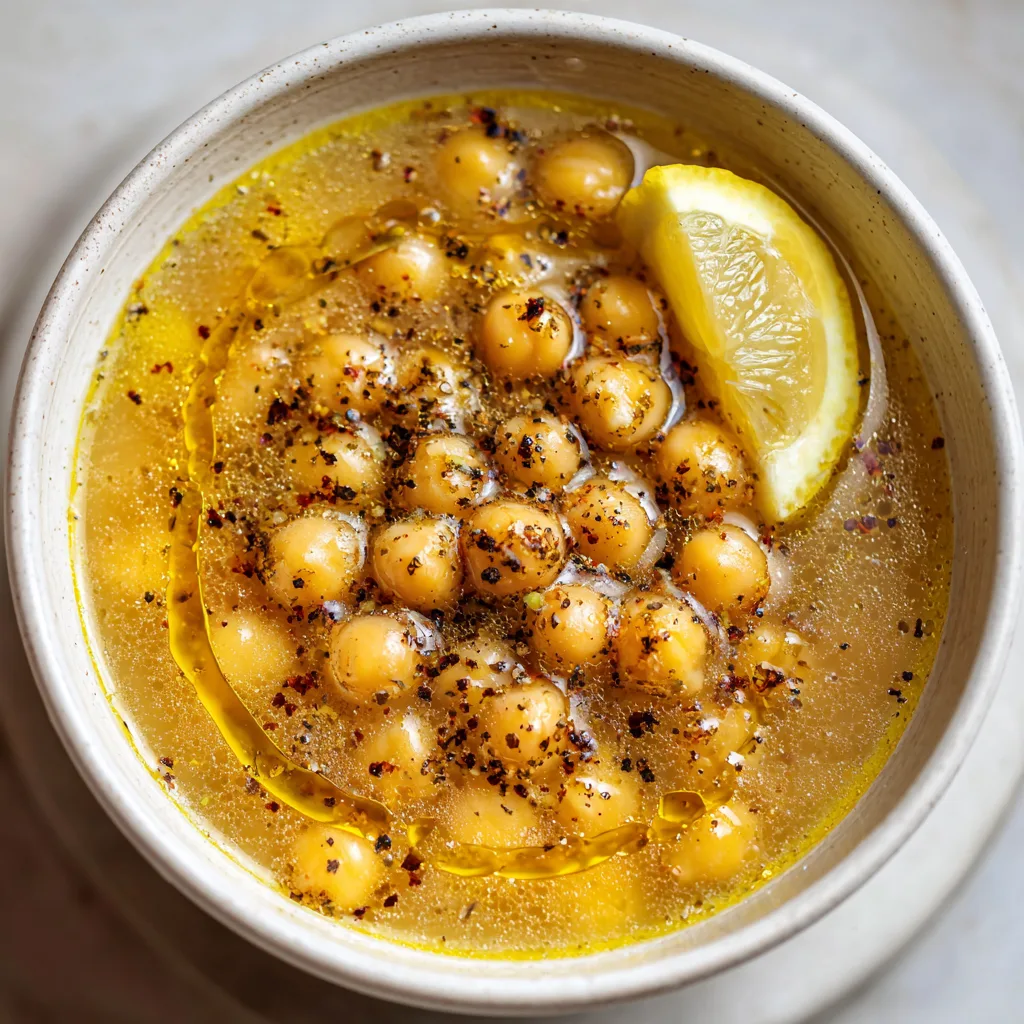Greek Chickpea Soup: A Slow-Simmered Greek Tradition
Greek Chickpea Soup, known throughout Greece as Revithia, is not just a recipe—it is part of the culinary heartbeat of the Greek islands, particularly Sifnos, where this soup is traditionally slow-cooked overnight in clay pots. It is a dish deeply rooted in community, simplicity, and the philosophy of Mediterranean nourishment: few ingredients, slow time, deep flavor, and a connection to place.
Revithia represents the idea that comfort does not require complexity. With humble staples—chickpeas, onion, olive oil, lemon, salt, and slow simmering—this soup captures the essence of Greek home cooking: minimalism driven by tradition and memory. It is soothing, wholesome, and richly flavored despite its restraint.
This dish is served during cooler months but appears regularly on Greek Sunday tables, weddings, feast days, and informal gatherings. It is not merely eaten—it is shared. It is ladled slowly into bowls, accompanied by fresh bread, olives, and perhaps a slice of sheep’s milk cheese. It invites conversation, warmth, and slow eating—the kind of meal where time feels generous.
In our fast-moving world, Revithia teaches patience. It invites us to be present as the chickpeas soften, the broth thickens, and the aroma fills the home. A meal like this reminds us that the most memorable food is often born from quiet care.Ingredients (Dashes)
- 2 cups dried chickpeas (soaked overnight)
- 1 large onion, finely chopped
- 2–3 garlic cloves, minced (optional but widely used)
- 4 tablespoons extra virgin olive oil
- 1 bay leaf
- Sea salt, to taste
- Freshly ground black pepper, to taste
- Juice of 1–2 lemons (to taste)
- Extra olive oil for finishing
- Optional garnish: parsley or thyme
- Optional creaminess: 1 tablespoon tahini stirred in at the end

Ingredients
- 2 cups dried chickpeas (soaked overnight)
- 1 large onion, finely chopped
- 2–3 garlic cloves, minced (optional but widely used)
- 4 tablespoons extra virgin olive oil
- 1 bay leaf
- Sea salt, to taste
- Freshly ground black pepper, to taste
- Juice of 1–2 lemons (to taste)
- Extra olive oil for finishing
- Optional garnish: parsley or thyme
- Optional creaminess: 1 tablespoon tahini stirred in at the end

Instructions
- Soak the chickpeas overnight in a large bowl of cool water. Drain and rinse before cooking.
- Heat olive oil in a large pot over medium heat. Add chopped onion and cook until soft and translucent.
- Add garlic (if using) and stir briefly until fragrant.
- Add the drained chickpeas and stir to coat in the oil and aromatics.
- Pour in fresh water to cover the chickpeas by at least 2 inches.
- Add bay leaf and bring to a gentle boil.
- Reduce heat to low, cover, and simmer for 1.5–2.5 hours until chickpeas are tender and the broth thickens.
- Season with salt, pepper, and lemon juice. Drizzle with extra olive oil.
- To thicken, mash a handful of chickpeas directly in the pot.
- Serve hot, with extra bread and olive oil.
FULL ARTICLE
There are recipes that nourish the body, and there are recipes that nourish the soul. Greek Chickpea Soup—Revithia—belongs wholeheartedly to the second category. It is not merely a collection of ingredients simmered in a pot. It is history, memory, climate, and hospitality held in a bowl. A dish that asks for time, offers warmth, and rewards patience.
Revithia is one of the oldest, most deeply rooted comfort foods of the Greek islands, particularly Sifnos, where the soup is traditionally slow-cooked in clay pots overnight in wood-burning ovens. Imagine a small Greek village touching the Aegean Sea: white-washed houses, stone-lined terraces, olive trees leaning into the wind, and the smell of chickpeas simmering slowly, filling the air just before dawn. Revithia is part of that world.
A Simple Dish With Monumental Meaning
The beauty of Revithia lies in its simplicity:
- Chickpeas
- Onion
- Olive oil
- Lemon
- Water
No complex spices.
No expensive ingredients.
No elaborate cooking tools.
Yet somehow, from this minimalism comes flavor that feels deep, round, soothing, and complete.
This is a dish born of resourcefulness. Greek islanders lived long periods with limited ingredients: what they could cultivate, what they could preserve, what they could share. Chickpeas were durable, affordable, protein-rich, and versatile. Olive oil was not merely a cooking fat—it was a treasure, a life source, the pride of each household.
Together, chickpeas and olive oil formed not just a meal, but a relationship to land and community.

Slow Cooking: The Culture of Patience
Revithia is traditionally prepared in a slow-fired clay vessel called a “skepastaria.” The soup cooks overnight at a very low heat, sometimes up to 8–12 hours. That slow simmer coaxes chickpeas to soften without breaking; their starches release gently, transforming water into a velvety broth.
The slow cooking also has a deeper cultural meaning:
- It symbolizes waiting
- It honors tradition
- It invites togetherness
On Sunday mornings, villagers return from church to find Revithia ready and waiting: warm, fragrant, nourishing. It is the meal that gathers families around the table—not for speed, but for time shared.
The Flavor Profile: Soft, Lemony, Olive-Oil Rich
The taste of Revithia is subtle but deeply satisfying.
The chickpeas offer earthiness and creaminess; the onions melt into the background, creating a soft sweetness. The olive oil carries everything—it’s fruity, smooth, golden, and soothing. The lemon juice enters last, bright like sunshine falling across a stone wall. The finish is clean, warm, comforting.
It is a soup to breathe into.
A soup to eat slowly.
A soup to enjoy with quiet appreciation.
The Science of Why Slow-Cooked Chickpeas Taste Better
When chickpeas cook slowly:
- Their cell walls break down gently
- Natural starches thicken the broth
- The texture becomes creamy, not mushy
- The flavor turns round and deep
Fast cooking makes chickpeas tough and chalky.
Slow cooking makes them tender and luxurious.
This is not just tradition—it is science meeting time.
Regional Variations Across Greece
Revithia changes subtly from island to island and family to family:
| Region | Variation |
|---|---|
| Sifnos (classic) | Cooked overnight in clay; no garlic; thickened by smashing chickpeas |
| Naxos | A bit more lemon and sometimes a pinch of oregano |
| Crete | Often includes garlic and may use rosemary |
| Athens households | Sometimes finish with a spoon of tahini for creaminess |
But no matter where it is served, one constant always remains:
Revithia is humble food, made with love.

Greek Chickpea Soup (Revithia)
Ingredients
Equipment
Method
- Soak the chickpeas overnight in plenty of water, then drain and rinse.
- In a large pot, heat the olive oil over medium heat and cook the onion until soft.
- Add garlic (if using) and stir briefly until fragrant.
- Add chickpeas and stir to coat in the oil and aromatics.
- Add enough water to cover the chickpeas by 2 inches. Add bay leaf.
- Bring to a boil, then lower heat and simmer 1.5–2 hours until tender.
- Season with salt, pepper, and lemon juice to taste.
- Serve with an extra drizzle of olive oil.
Notes
A Dish with Emotional Memory
Ask any Greek person about Revithia, and you’ll likely receive a story, not a recipe.
They may speak of:
- Their grandmother ladling soup into bowls.
- Eating it after coming home cold from winter weather.
- The smell waking them in the morning on Sundays.
- The warm, gentle heaviness that fills the stomach and calms the mind.
Food like this is emotional architecture.
It tells us where we come from and who we belong to.
Serving Suggestions
To serve Revithia traditionally:
- Pair with fresh village bread or crusty sourdough
- Offer a bowl of olives
- Finish with a heavy drizzle of olive oil
- Place lemon wedges on the table
For a modern, café-style presentation:
- Add a sprinkle of parsley
- Serve with toasted pita
- Add a side salad of greens & cucumber
Optional Flavor Enhancements (Authentic but Flexible)
- Stir in 1 tablespoon tahini for creamy depth.
- Add rosemary while simmering for herbal aroma.
- Add a small pinch of chili or smoked paprika for warmth.
- Blend ⅓ of the soup and pour back for a silky texture.
But remember:
The heart of Revithia is simplicity.
Nutritional Benefits
Revithia is naturally:
- Vegan
- High in plant protein
- High in fiber
- Packed with minerals
- Low-cost and nourishing
This soup feeds the body very well.
Storing & Reheating
Revithia tastes even better the next day.
- Refrigerate airtight: up to 4 days
- Freeze: up to 3 months
- Reheat gently, adding water if thickened
Conclusion: A Bowl with History, Warmth, and Heart
Greek Chickpea Soup is not flashy.
It does not demand attention.
It does not rush.
It invites you to slow down, to savor warmth and patience, to connect to a meal as thousands of others have before you.
Each spoonful tastes like:
- Comfort
- Care
- Quiet joy
- The memory of kitchens filled with love
Revithia is not simply soup.
It is heritage.






